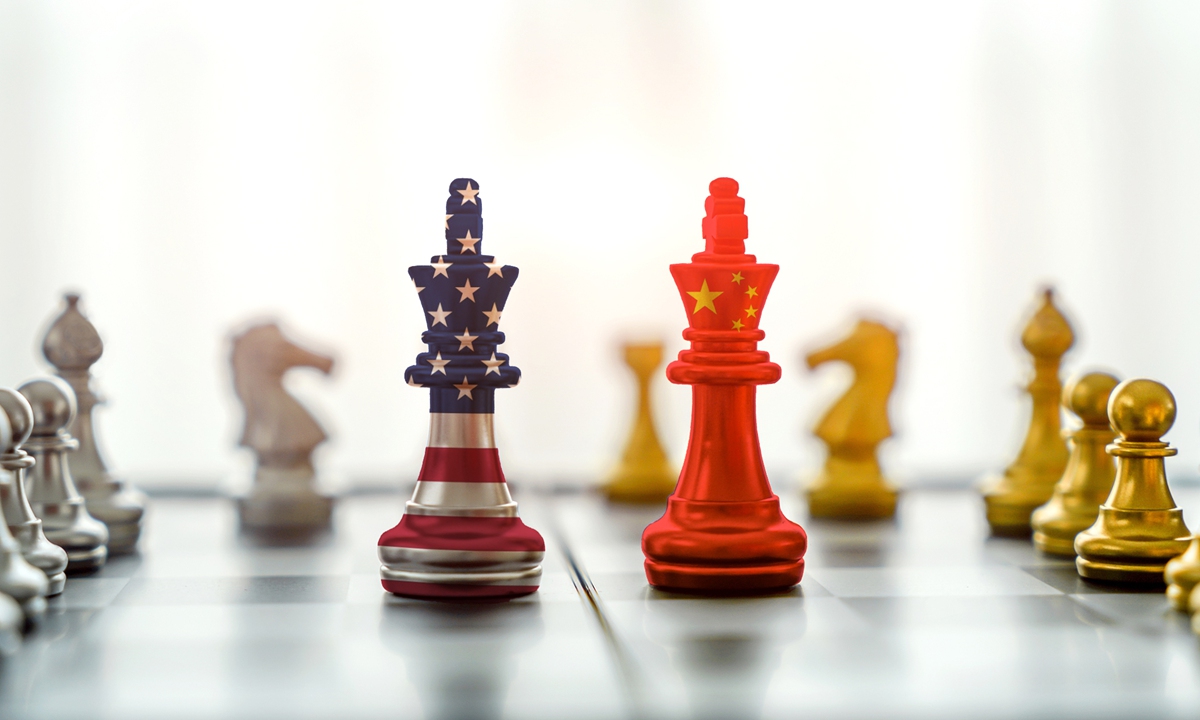China issues five 'self-defense' countermeasures in two weeks amid US provocations
By Zhang Hui and Zhang Han Source: Global Times Published: 2020/7/14 22:38:40

China US
China on Tuesday announced sanctions on US arms dealer Lockheed Martin Corp, the major contractor of US arms sales to the island of Taiwan, which is the fifth reciprocal countermeasure against the US since June 29 in response to US moves that took the initiative in deteriorating bilateral relations and escalating tensions.
Chinese analysts believe China's reciprocal measures against the US are usually equal or weaker than compared to US' sanctions against China in terms of its scope and intensity, as China's countermeasures, which are deemed as reactive and defensive, were attempted to minimize the conflicts with the US and restore bilateral relations that have nosedived their lowest point in decades.
After US Secretary of State Mike Pompeo said that most of China's maritime claims in the South China Sea are "completely unlawful," US Aassistant Secretary of State for the Bureau of East Asian and Pacific Affairs David Stilwell said on Tuesday that the US could impose use sanctions against Chinese officials over the South China Sea issue.
In response, Chinese Foreign Ministry spokesperson Hua Chunying said at Wednesday's media briefing that as the most developed, powerful country, the US has frequently threatened to impose sanctions, which was pathetic.
"We hope that sanctions will not be the shining label left by the US to the world," she said, adding that China will not be afraid of sanctions. If the US wants to set the wind blowing and waves rolling, let the storm come more fiercely, Hua said.
In response to the $620 million worth of arms sales to the island of Taiwan, China will impose sanctions on the Lockheed Martin Corp, the main contractor of the deal. China urged the US to abide by the one-China principle and the three joint communiqués between the two countries to avoid further damaging bilateral relations and peace in the Taiwan Straits, Chinese Foreign Ministry spokesperson Zhao Lijian said in Tuesday's routine press conference.
The latest is the fifth countermeasure since July 1 in response to US provocations over a range of topics including Xinjiang and Hong Kong.
On June 29, the Chinese Foreign Ministry announced to impose visa restrictions on personnel from the US who "behave poorly" on Hong Kong-related issues. The decision came amid US pressure on China over Hong Kong and blatant interference into the territory's internal affairs, including the passing of the Hong Kong Autonomy Act.
Two days later, the Chinese Foreign Ministry urged US media outlets AP, UPI, CBS and NPR to report and declare information about the operations of their branches in China, including staff and finances as a countermeasure against the US listing of four more Chinese media outlets as foreign missions.
On July 8, in a countermeasure against US visa restrictions on some Chinese officials over Tibet, China announced to restrict visas for US personnel who have acted maliciously on issues related to Tibet..
The Foreign Ministry on Monday announced sanctions against the Ambassador at Large for International Religious Freedom Samuel Brownback, US Senator Marco Rubio, Ted Cruz, Republican Chris Smith, and the US Congressional-Executive Commission on China (CECC), following US sanctions on Chinese officials over Xinjiang-related issues.
The CECC responded to the sanctions on Twitter, claiming the Chinese move was just trying to intimidate and silence critical voices. Cruz and Rubio expressed that the visa ban would not affect them as they did not have any travel plans to China.
Lü Xiang, a research fellow on US studies at the Chinese Academy of Social Sciences in Beijing, told the Global Times on Tuesday that China will not actively escalate the situation or stir up more trouble, and China's countermeasures, which maintain the conflict at its lowest level, aimed at creating more space for the US to logically reason and for China-US relations to return to normal.
"This is not just for the benefit of people from China and the US, but also for the whole world. The struggle of two elephants may inevitably hurt the small animals nearby," Lü said.
US politicians, out of catering to anti-China forces and gaining more ballots in the presidential elections, continue to stir up more issues in bilateral ties, but most of its sanctions and measures are mostly "all talk but little action," analysts said.
But if the US moves to provoke China's military forces in the South China Sea or further restrict Chinese enterprises, the nation will be a "competent" opponent, analysts said.
Some reports predicted that more US sanctions against China are on the way.
The Wall Street Journal (WSJ) on Sunday reported that Trump administration officials recently discussed plans for Hong Kong in a White House meeting. Officials will regroup early this week and may announce sanctions or other measures, it said.
Gao Lingyun, an expert at the Chinese Academy of Social Sciences in Beijing, told the Global Times that the US sanctions against Hong Kong are like committing suicide, and it can only come up with symbolic measures without any actual effect.
The WSJ reported that the US government is considering more targeted sanctions against Chinese officials and trade measures against products made in Hong Kong, but it would have little impact.
The US is considering taking further steps against China's hacking efforts targeting the US, said the WSJ citing an anonymous official.
The US may sanction Chinese military officials or companies with visa restrictions on cybersecurity issues, as it frequently made groundless accusations that the hacking groups they detected were affiliated with the People's Liberation Army (PLA), according to Gao.
In response, China is likely to sanction certain US officials who frequently make such groundless accusations against China, Gao said. In a recent example, FBI director Christopher Wray claimed Chinese hackers have moved swiftly to target US pharmaceutical and research institutions.
RELATED ARTICLES:
Posted in: DIPLOMACY